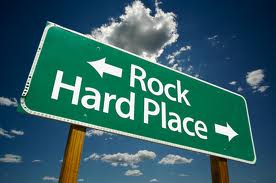We teach our children to compromise, but have we forgotten how to do it as adults?

I remember teaching my daughter about the meaning of the word “compromise” when she was quite young, like maybe five or six. She and her mom were having a disagreement and it appeared their positions were both intractable.
I came home from work that evening to find my wife explaining in the strongest possible terms to our daughter that she had to take a bath at that moment and my daughter was holding on strong to her anti-bath position.
From the moment I walked into the house from work, all I could hear was “NO!” Followed by “YES!” Both sides were dug in and the volume levels were escalating.
As I approached the bathroom where the issue was being litigated, I realized something had to be done to settle this policy disagreement before it deteriorated any further into a deep partisan divide. I didn’t want to filibuster, I was looking for a bi-partisan solution, so I asked a few questions to make sure I understood the two positions.
I discovered that the core disagreement was actually more about waking up on time for school in the morning than it was about taking a bath that evening. My wife’s assertion was that if our daughter didn’t take a bath that evening, she wouldn’t wake up early enough the next morning to take a bath before school.
Our daughter, however, was resolute, making clear that she would, in fact, wake up early enough the following morning to bathe before school. My wife was looking at me with that face that said, “Go ahead… disagree with me on this and you won’t live to see the next morning.”
I was in trouble, obviously, but there was no way out at this point.

So, I started explaining the meaning of the word “compromise,” mostly for my daughter’s benefit… although I had the good sense to keep that point to myself. (I’m a diplomat, not a moron.)
I proposed a deal be reached between the two polarized constituencies… one that I hoped would make both sides reasonably happy, although neither would get everything they wanted.
I asked our daughter if we were to compromise and not make her take a bath that evening, would she be willing to commit to waking up early enough the next morning to take a bath before school? She assured me that she would.
Mom wasn’t so sure, so I added a penalty clause that I knew mom would like. I looked at our daughter and said, “However, if you fail to keep your commitment and you don’t wake up on time for a bath before school tomorrow, then from now on we’ll have to listen to Mom on this sort of issue.” Again, she replied that she understood and agreed to the condition.
My wife wasn’t totally on board with my stepping in to negotiate a peaceful settlement, but I reminded her that we were teaching our daughter about compromise and that she had committed to the terms and would be bound by them.
To make a long story shorter, if that’s still possible, the next morning our daughter woke up at about 6:30 AM, as promised, and got straight into the bath as specified in our compromise agreement. She arrived at school on time and that was that.
The next time the same sort of topic came up in our family, we were able to avoid the drama of disagreement and proceed to working out a compromise that everyone could accept. I can’t even imagine how different our lives would have been without our shared dedication to seeking compromise instead of one party trying to dominate another.

Democracy is dependent on compromise…
The U.S. Constitution, adopted in 1788, was the first formal blueprint for a modern democracy that the world had ever seen and from the beginning our Founding Fathers understood that compromise would be inherent to a successful democracy.
The term “democracy” is the merger of two Greek words: “demos” (the people) and “”kratia” (power or authority). So, a democracy is therefore a form of government that gives power to the people… and with so many different people involved in governing themselves, it meant compromise would be required.
Before democracy appeared on the world scene, governments were largely monarchies… as in countries were ruled by individuals and families… kings and queens, if you will. And back in the late 18th-century, even though many believed that people having such a voice was likely to bring disorder and disruption, a democratic government was still seen as preferable to the monarchies of Europe.
It now occurs to me that Democracy not only requires compromise but also that only bi-partisan legislation becomes truly effective policy and law. When either party uses power to dominate the other… when political power is used to impose their will on the rest of the population, it seems to cause more problems than it solves.
On the other hand, when both parties are forced to compromise, the outcomes are always much better for everyone involved.
Amy Gutmann, Ph.D. president of the University of Pennsylvania, and Dennis Thompson, Ph.D. the Whitehead professor of political philosophy, are two prominent political theorists. In their book, “The Spirit of Compromise: Why Governing Demands It and Campaigning Undermines It,” the two discuss compromise as being a “requisite for a governing democracy.”
As the two say in the opening of their book: “COMPROMISE IS DIFFICULT, but governing a democracy without compromise is impossible.”
During political campaigns, politicians intentionally do not compromise. Rather, they seek to differentiate themselves from their opponents in order to win the election. But, once elected, they shouldn’t be acting in their own best interests. Once elected, it’s time for them to start doing what’s in the best interests of the country… and that means compromising with their fellow legislators, not creating gridlock as has increasingly been the case.
Today, in Washington D.C. and throughout the country, we seem to have forgotten that compromise is crucial to our collective future… that without dedication to compromise we are doomed to underperform our potential, assuming we make any progress at all.
Incredibly, it appears that compromise is now seen by most of our elected officials as a bad thing.
Republican Senator Mitch McConnell recently made this point clear when he warned his fellow Republicans that if they failed to pass the bill repealing Obamacare, they’d be forced to work with the Democrats on health care. He said it as a warning… like being forced to work with Democrats would be the worst possible outcome.

Remember, President Obama passed the Affordable Care Act (ACA) without Republican support and the Republicans spent the next six years trying to defund or repeal it… even though it’s now obvious that they had no alternative plan to propose. If the Republicans today were to repeal it without Democratic support, what do you think would happen when the pendulum swings back and gives Democrats control.
What’s hard to understand is why they did it the way they did it. They were damned if they passed the terrible health care bill… and damned if they didn’t.
What the Republicans should have done is brought Democrats into the process. That way, if no compromise was possible, they could have blamed the Democrats for the situation, or at least the Democrats could have shared the blame. But, in a world where the worst possible outcome is working together, our democracy is no longer functioning.
If each party when in control only uses their power to force the other side into positions signaling political defeat, it only deepens any partisan divide… and in the long run nothing gets solved and we all suffer as a result.
It wasn’t always the way it is today.
It’s not that we’ve never been extremely divided before, politically speaking. We were about as divided as could be imagined back in 1968 or ‘72, for example. The Vietnam War, civil rights, women’s rights and more had turned us into proverbial Hatfields and McCoys.
Political campaigns were always divisive, of course. But once elected, our representatives knew they had to work together to pass legislation… until the next campaign season, at least. They were adversaries across the aisle but friends after work.
For example, want to know who Democratic Senator Ted Kennedy’s best man was at his wedding? Lifetime Republican Senator from Utah, Orin Hatch.
Today, that sort of thing seems close to impossible.

Perhaps, they are merely a reflection of us…
Maybe the reason our elected representatives are so vehemently against the idea of compromising with the opposing party is that too many of us don’t want them to do so. I don’t fully understand why, but it seems like far too many of us have become intractable in our opinions on any number of issues.
There are a few areas that I’ve studied and therefore feel confident when opining, but not that many. Like, I wasn’t in favor of building a wall, but also I don’t know a whole lot about immigration in this country so I certainly could be wrong. I also think that if 50 percent of American voters want a wall, then it probably could be fine by me simply by virtue of so many others wanting it. Isn’t there some sort of compromise to be had here?
Couldn’t people on both sides of the immigration debate find some way to meet in the middle? I mean, right now there’s no wall and no immigration reform… shouldn’t there be some common ground on which to begin negotiating a bi-partisan solution, as opposed to one party waiting until it can force whatever down throats on the other side?
Today, it seems like those on one side don’t just disagree, they absolutely hate those on the other. You hear people who voted for Donald Trump say they “love him,” and/or that they “hate” Hillary. With others it’s “love” Hillary and “hate” Trump. Truth is, I’ve never felt either way about a U.S. president or politician.

I’ve liked some presidents more than others at certain moments, but love or hate? I’ve never felt that strongly about any of them. In my lifetime, I’ve seen Presidents Johnson, Nixon, Ford, Carter, Reagan, Bush I, Clinton, Bush II, Obama… and now Trump. Which one am I supposed to love or hate? I can’t believe anyone can muster enough emotion about any of them that it would rise to the extremes of love or hate.
I’ve liked some presidents for some reasons and disliked them for others. President Reagan did some very good things and some not so good things. And the same is true for all the rest. Mostly, I find them all a bit boring (Trump excluded, he’s not boring) and none of them do what they promise they’ll do.
(Obama was disappointing in many ways, but he did help me with my picks for the Final Four, which was cool. LOL)
I’m not even sure which issue would make me hate someone because of their view. I suppose members of the KKK or some Neo-Nazi group might come to mind, but even then, I’d be more likely to hate someone for something they actually did, as opposed to their beliefs.
Since when did we all become so certain of our own opinions?
A close friend of mine once told me that he was against the death penalty. I was surprised and told him that I was for it.
He went on to explain his reasoning and an hour later I changed my mind. Basically, his points included things like the number of people who have been convicted but later been found innocent… and that it’s not a deterrent, but the point is that I wasn’t a death penalty expert, by any means, and he convinced me that I should reconsider my previous position on the subject.
It was a great discussion. I learned a lot. I certainly didn’t hate him for having an opinion different than mine. And it didn’t even occur to me to call him names because of his opinion on the issue.

Gun violence is another issue that I’m not sure how to address. It’s definitely a problem, but I’m not at all sure how to solve it. And I’ve heard compelling points from both sides as to why one thing or another won’t accomplish the objective of reducing the incidence of mass shootings, for example.
But, whatever you do, don’t even try to get into a discussion these days about gun control because chances are you’ll either end up being branded a lib-tard or a gun toting redneck. (On one occasion, I tried explaining that I wasn’t sure how the issue of automatic weapons should be addressed and someone called me a wimp… lol.)
Since when did our opinions on so many issues become sacrosanct and seemingly immune to criticism or compromise?
Democracy requires compromise, you could even say that compromise is the very essence of effective democracy, right? Democracy is not supposed to be one party trying to force their will on the other because that doesn’t get us anywhere. As soon as the opposing party gains power, they simply start undoing whatever the last administration or congress did.
The end result is an enormous amount of wasted time and effort, while the country remains stagnant and real problems go unsolved unnecessarily.
Our elected representatives today never stop campaigning and therefore compromise is seen as weakness. And not only is it seen as weakness… today, you pay a political price for compromising. We’ve gone down a rabbit hole to a place where everything is upside down.

What should be seen as virtuous has become vile.
We teach our children to compromise because we understand that compromising is how people move forward together. My daughter learned to do it when she was in kindergarten, if memory serves. And she was quite good at it right from the start.
Surely, our elected representatives know how to compromise, so since they’ve stopped even thinking about compromising it has to be because they see doing so as a problem more than a solution.
It seems to me that the desire for compromise started slowing down under President G.W. Bush and completely stopped the day Barack Obama took office in 2009. That’s the day that Mitch McConnell announced that the Republicans would be voting against whatever the new president proposed, no matter what it was.
Since then, we’ve been treading water, running in place, or whichever metaphor you prefer to represent no real progress. And no one benefits from our government being deadlocked most of the time and accomplishing little as a result.
Isn’t compromise the only answer? Don’t we all recognize that compromise is very often the only way we can move forward together?
If not, maybe my daughter could help.
Mandelman out.


